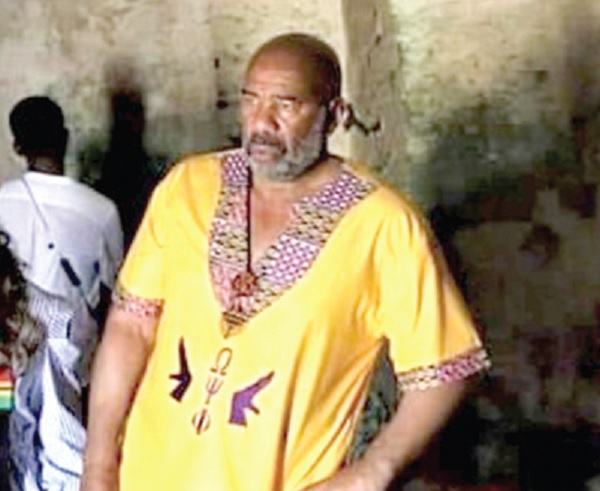
Ghana attracts Steve Harvey, other greats to Africa-Nkrumah’s continental vision lives!
Ghana’s independence celebration in March 1957 was possibly the greatest international event the African continent had ever known in modern times.
It was not for nothing that Osagyefo Kwame Nkrumah surrounded himself with some of the best internationally minded thinkers of that era.
It helps to reflect that there was a time when this small African country - then known as the Gold Coast - was in international headlines for its promise of greatness worthy of emulation by the larger African continent.
Led by a giant from a small village of Nkroful – Kwame Nkrumah - the new independent Ghana occupied the minds and presence of C.L.R. James; Rev Dr Martin Luther King Jr; Malcolm X; W.E.B. Du Bois; George Padmore; US Congress firebrand Adam Clayton Powell; Kwame Toure (formerly Stokely Carmichael); as well as the great writers: Maya Angelou; James Baldwin; Richard Wright; and others.
Earlier, Louis “Satchmo” Armstrong – one of the greatest trumpeters ever - had led a tour to Ghana of musicians rooted in the jazz culture of New Orleans, Louisiana.
Likewise, the greatest heavyweight boxer – Muhammed Ali – visited the Osagyefo and Ghana in the 1960s.
Ghana - then and now – has evolved as a Mecca for the pilgrimage of Black people, many escaping from the ravages of racism the world over seeking a larger meaning and purpose.
Soul to soul
In March 1971, some top musicians from the United States boarded a plane for Ghana to perform in celebration of Ghana’s independence.
Dubbed the “Sold to Soul Festival”, the event witnessed the musical performances of Wilson Pickett, Les McCaan, Eddie Harris, Roberta Flack, Ike & Tina Turner, the Staple Singers, Carlos Santana, Willie Bobo, and The Voices of East Harlem.
Thousands of people filled Accra's Black Star Square for a continuous 15 hours of music.
The event was emceed by Mike Eghan, who noted in his book, “Mike Eghan: The Emperor’s Story”, that: “One of the highlights of my career as a disc jockey; and radio presenter was my role as Emcee (Master of Ceremony) for the historic musical concert dubbed ‘Soul to Soul.’
The aim of this musical extravaganza was to bring Africans and African American artistes together to jam on the African continent to retrace their historical roots.
It was believed that such an attempt would galvanize Black people all over the world, along with the vision that Osagyefo Dr Kwame Nkrumah had for the Black Race.”
He noted that “the ‘Soul to Soul’ event at the Black Star Square in 1971 was the West African version of ‘Woodstock’, and attracted a galaxy of stars never before assembled on the African continent.”
The Ghanaian stars included The Magic Aliens, Guy Warren (Ghanaba), the Damas Choir, and Charlotte Dada of the Uhuru Band.
The festival was planned to coincide with the annual celebration of Ghana's independence.
It also served as an invitation to a "homecoming" for African American artists to return to Africa.
In historical terms, the event explored the longstanding legacy of cultural exchange with African diasporans as envisaged originally in the 1950s by Kwame Nkrumah, Ghana’s first President.
Since then, Ghana has witnessed an exodus of African Americans including Isaac Hayes, B.B. King, Roy Ayers, Boris Cudjoe, Barack and Michelle Obama, and many others.
In a recent interview with Steve Harvey, he shared his experiences when he first visited Ghana, as follows: (Edited)
Steve Harvey
See, I bought the international rights to "Family Feud."
I did what they say you can't do: You can't produce TV in Africa.
Yes, you can! So, I did it! I brought the first American show to Africa.
I did the African version of it.
It ended up being the number one show in South Africa, and the number one show in Ghana.
And it was beautiful being there.
Wow! It's a beautiful place.
I would recommend everybody to go to Africa.
It's the birthplace of mankind.
That's right, and for African Americans, I think, it's even more special.
You know, to wake up and not have to be conscious that you are black.
Just to be able to wake up and walk outside, and you're just yourself today.
You don't have to filter that in.
There's not a day I wake up over here [in America] that I don't filter that In.
I have to factor that in: when I’m driving - when I’m getting pulled over - when I’m calling a cab, you know, you have to filter that in.
It was such a rewarding thing.
My son said the same thing.
You don't look to wake up and not be a minority; you don't know what that is.
If you have never had to deal with that, congratulations.
How beautiful is that! But, to wake up and not be a minority, I didn't know what that felt like.
I said, man, I got to get a house over [in Ghana].
Privilege, it's exactly how I felt.
I want to live like that.
The writer is a trainer of teachers, a leadership coach, a motivational speaker and a quality education advocate.
E-mail:
